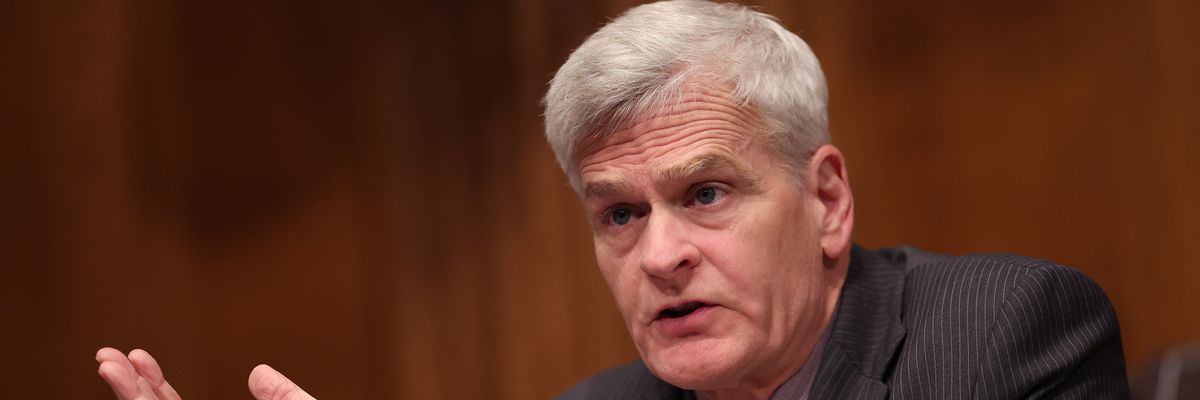A Republican senator heavily bankrolled by the pharmaceutical industry spoke out Thursday against calls to cancel medical debt, arguing that wiping out a financial burden saddling
100 million Americans "is not a solution."
"One-time cancellation of medical debt... is a Band-Aid approach to a one-time problem that's gonna come back," Sen. Bill Cassidy (R-La.) said during a Senate Health, Education, Labor, and Pensions (HELP) Committee
hearing on the nation's medical debt crisis.
After dismissing medical debt cancellation on the grounds that it would not address the "root causes" of the crisis, Cassidy—the ranking member of the Senate panel—proceeded to make clear that he opposes the kinds of transformational healthcare reforms that
advocates say are necessary to eliminate the problem of medical debt for good.
"We may hear today about Medicare for All," Cassidy
accurately predicted. "But I also say that a healthcare system in which you think it's free because the taxpayer is footing the bill—you've never seen how expensive something can be until you perceive that it is free."
Watch Cassidy's remarks:
Cassidy is a major recipient of campaign cash from the pharmaceutical industry, whose stranglehold on prescription drug prices has been a
significant driver of medical debt in the U.S.
Over the course of his career, the Louisiana Republican has raked in over $1 million in donations from the pharmaceutical and health product industries,
according to OpenSecrets.
STAT Newsreported last year that Cassidy reaped "a slew of campaign donations" from Big Pharma executives shortly after he officially became the top Republican on the Senate HELP Committee, which is chaired by Sen. Bernie Sanders (I-Vt.)—a leading supporter of canceling medical debt and enacting Medicare for All.
In May, Sanders and several Democratic allies
introduced legislation that would eliminate all of the roughly $220 billion in outstanding U.S. medical debt.
Contrary to Cassidy's suggestion that the bill would do nothing to prevent the future accrual of medical debt, Sanders' legislation would "amend the Public Health Service Act, updating billing and debt collection requirements to limit the potential for future debt to be incurred," the senator's office
noted in a summary.
Neale Mahoney, a medical debt expert at Stanford University, said in a statement after the bill was unveiled that the measure "cuts off medical debt at the source by requiring hospitals to uphold their obligation to provide charity care to eligible patients who cannot afford to pay and supports hospitals so they can forgive debt before it gets sold to debt collectors."
During his opening remarks at Thursday's hearing, Sanders called medical debt "one of the most outrageous and cruelest" aspects of the nation's "dysfunctional" healthcare system.
"Pharmaceutical companies and insurance companies charge the American people for the 'crime' of getting sick," said Sanders. "Let's be clear: The medical debt crisis our nation is experiencing is a uniquely American phenomenon—does not exist in other countries around the world."
"We are the only major country on Earth," the senator added, "where an emergency visit to a hospital can cause patients to lose their homes and their life savings."
Recent
polling found that a majority of Americans believe it is "extremely or very important" that the federal government act to provide relief for those with medical debt. The health policy organization KFF estimates that around 3 million U.S. adults have more than $10,000 in medical debt and 14 million owe more than $1,000.
Abdul El-Sayed, director of Wayne County, Michigan's Department of Health, Human, and Veteran Services and an outspoken Medicare for All supporter, said in his
testimony at Thursday's hearing that a single-payer healthcare system would "address the porous nature of health insurance" and help prevent the accumulation of medical debt "by guaranteeing universal health insurance coverage from birth."
"One of the main drivers of costs in our current system is administrative overhead, higher in our country than in any other country in the world," said El-Sayed. "Much of that overhead is imposed by the complexity of billing multiple health insurers. With only one insurer that bears no profit motive, we could eliminate some of that cost burden—ultimately reducing the costs born on Americans that show up as medical debt."

